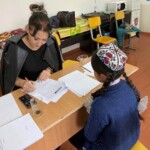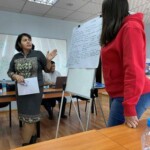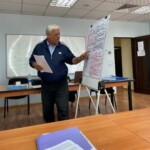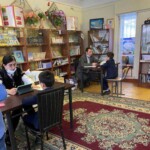Social-emotional learning and foundational skills
With an emphasis on foundational skills – reading and math in particular – in education projects and systems across the globe, it is important and refreshing to see the growing focus alongside those on another critical foundational skill: social and emotional skills. Since its inception, EdIntersect has brought a commitment to an intersectional approach to education as many students experience compounding adversity when they identify with multiple groups. Strengthening the social and emotional development of student populations can serve as protective factors, and this means that social and emotional skills are a critical part of a child’s education now and across their lifetime.
On July 25 and 27, 2023, EdIntersect led two webinars on social-emotional learning (SEL) for the United States Agency for International Development (USAID)’s Education in Crisis and Conflict Network. Staff shared their experiences conducting research in Tajikistan with the Learn Together Activity (LTA), a five-year project funded by USAID and managed by Chemonics International and its partners, including EdIntersect, in close collaboration with the the Ministry of Education and Science, the National Testing Center, and the Institute for Education. A recording of the webinar event is here: https://www.edu-links.org/events/exploring-social-emotional-learning-and-foundational-skills
The content of this SEL work is also incorporated in the joint effort of USAID and UNICEF to create the Local Engagement in Social Emotional Learning and Soft Skills Measurement: A Compendium of Cases for the SEL/SS Measurement Taskforce. The Compendium will be available soon on EduLinks as well: https://www.edu-links.org/
Social and emotional skills are a set of cognitive, social, and emotional competencies that children, youth, and adults develop through everyday life experience as well as focused instruction. Evidence demonstrates that social and emotional skills support the success of learners of all ages at school, at work, and in life. The incorporation of SEL in education systems can enable more developed learning environments that support all learners in reaching their full potential. LTA implements social-emotional learning (SEL) through explicit and integrated approaches, such as assessment, standards, teacher training, image-based materials, and public service announcements. The baseline study of LTA in 2022 assessed second and fourth grade students’ SEL competencies alongside reading and math skills. An endline study in 2025 will assess these skills again.
The first webinar session on July 25 was devoted to a collaborative presentation from EdIntersect on the results of the LTA baseline study. Fourth grade students tended to score higher overall on SEL competencies than second graders, which is perhaps not surprising given the older age and developmental stage. Students in Russian language classrooms tended to show higher levels of SEL competency than students in Tajik language classrooms. This observation could also be associated with other factors, such as urbanicity — Russian classrooms are predominantly in urban areas, while Tajik classrooms are in both urban and rural areas. Relationships between SEL competencies and reading and math performance did not present a clear pattern. Amidst the analyses, we did note that empathy and conflict resolution skills showed perhaps the most evidence across language groups of a relationship with better reading scores. Weaker associations with math performance were noted, again though with conflict resolution being a domain showing a small but evident association with better math performance. We also observed that most associations were stronger in grade 2 than in grade 4. Urbanicity showed some moderation effects, and the association is stronger in the rural areas than in urban areas. When there is moderation, most of the time the observed association is stronger for girls than for boys but this is even less systematic than what we observed when looking at urbanicity.
Participants in small group discussions in the second webinar session on July 27 noted many similarities between the Tajikistan context and their operating contexts around the globe. This included multilingualism, multiculturalism, and the need for local actors to define SEL in each context for themselves. Participants shared challenges in collecting quality data and unifying vocabulary on SEL competencies, but saw emerging opportunities in sharing SEL resources and engaging local partners to mitigate them.
Before tool development in October 2021, the team analyzed the curriculum and existing SEL tools, including the ISELA developed by Save the Children. Three areas in the Tajikistan curriculum – self-awareness and self-management, responsive decision-making, and social interaction corresponded with domains investigated and retained for the baseline study for social-emotional skills items: Relationships and communication, stress management, empathy, perseverance, conflict resolution, interactions with schoolchildren, and self-concept. Pre-testing with students and feedback sessions during the workshop ultimately led to two tools, one in Tajik and one in Russian, that encompassed in-depth conversations on appropriate language, scoring, and assessor training needs.
Most research about SEL comes from high-income countries. Learners from low and middle-income countries certainly face different challenges, especially if they live in conflict areas. Tajik and Russian are the primary languages of instruction, and Uzbek and Pamiri are also commonly spoken at home in some parts of the country. Tensions in the Gorno-Badakhshan Autonomous Province (GBAO) region, a Pamiri-speaking region, intensified in May 2022 while EdIntersect was collecting data. As a result, the baseline data collection in the region had to be cut short. The team wondered whether they would see differences, given the conflict in the region, in that student group in SEL skills and relationships with reading and math. Notable differences were not observed at baseline, but could be seen in later data collections. EdIntersect will continue to work toward the development of social and emotional learning for students with intersectionality infused in the approach and analysis.




